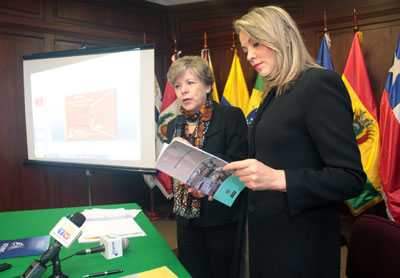ECLAC and UNASUR to Foster Regional Integration With an Emphasis on Infrastructure
Topic(s)
During her visit to Ecuador, the Executive Secretary of ECLAC Alicia Bárcena held a meeting with President Rafael Correa at Carondelet Palace.

(8 March 2012) The visit of the Executive Secretary of the Economic Commission for Latin America and the Caribbean (ECLAC) Alicia Bárcena to Quito ended last night, during which she held a meeting with the President of the Republic of Ecuador Rafael Correa, signing a cooperation agreement with the Union of South American Nations (UNASUR).
During her interview with President Rafael Correa at Carondelet Palace, the seat of the Government of Ecuador, the UN High Level Official revised the cooperation programme that ECLAC is conducting together with the Government of Ecuador, as well as joint initiatives to be developed in the years to come.
Through the agreement signed with UNASUR, both agencies commit to supporting a joint action plan for the biennium 2012-2013 focused on topics such as the information society, social issues, energy, infrastructure, natural resources, economy and finances, and integration and regional cooperation.
"Our intention as ECLAC is to offer UNASUR's member countries useful information to face the challenge of developing public policies, deepening the dialogue and cooperation for achieving a more equal, solidarity-focused and inclusive development," said Alicia Bárcena at the signing ceremony.
Also, Bárcena and the Secretary General of UNASUR María Emma Mejía presented the joint document Infrastructure for Regional Integration, which is an infrastructure diagnosis of countries in the region and where guidance for formulating public policies for this sector is provided.
The document states that South America is lagging behind in terms of infrastructure development, which limits its potential for growth in the long term and the likelihood of reducing poverty.
Likewise, this research shows that there is currently a gap of US$74.5 billion (3.4% of the regional GDP) in this sector caused by the disparity between infrastructure needs (demand) and the effective fulfillment of such needs (supply).
The Executive Secretary of ECLAC emphasized that an adequate supply of infrastructure services is key to any development strategy, as it directly influences the cohesion of three critical aspects: territorial issues (the connection of people with their environment), economy (delivering basic services for production) and social issues (improving life conditions and quality).
"We need a paradigm shift for moving towards an integral and sustainable strategy for developing infrastructure, logistics and mobility policies," said Bárcena.
During her visit to the Headquarters of UNASUR, Alicia Bárcena delivered a speech on the regional integration process and took part in a panel discussion with the Secretary General of UNASUR and the National Secretary of Planning and Development of Ecuador (SENPLADES) Fander Falconí.
In her speech, the UN High Level Official highlighted the importance of improving quality when incorporating the region into the international community, as well as re-assessing the strategies of global and regional alliances, aiming to leverage opportunities from South-South trade and to jointly approach countries in the Asia-Pacific region - especially China.
Also during her visit, Bárcena signed a Headquarters Agreement for the next meeting of the Committee on Population and Development, a subsidiary body of ECLAC, to be held from 4-6 July 2012, and held meetings with the Minister of Foreign Affairs, Trade and Integration Ricardo Patiño, the Minister of Economic Policy Jeannette Sánchez, the Coordinating Minister of Social Development Doris Soliz Carrión, the Secretary of SENPLADES Fander Falconí and the President of the Transition Commission of Ecuador Ana Lucía Herrera.
See also:
For questions, please contact ECLAC's Public Information and Web Services Unit.
E-mail: dpisantiago@cepal.org ; Tel.: (56 2) 210 2040.
Follow us on Twitter, Facebook, Flickr and YouTube.
Country(ies)
-
Ecuador
Contact
Public Information Unit
- prensa@cepal.org
- (56 2) 2210 2040